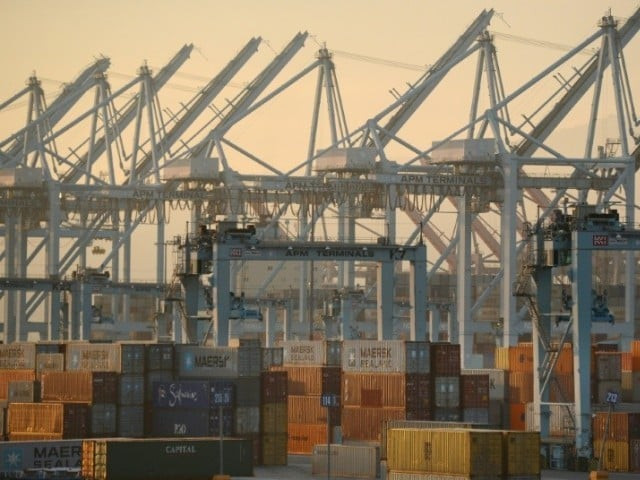US-China may be in a trade war, but Pakistan is looking at solutions
FPCCI official says country pursuing product-based preferential agreements

Different countries tend to excel in different sectors, like the US excels in arms, ammunition and machinery
PHOTO:AFP
With the world’s two largest economies at each other’s throats on trade issues, there are some that are adopting open doors and liberal policies.
Ahmed Zaman, head of research at the Federation of Pakistan Chambers of Commerce and Industry (FPCCI), says international trade has evolved as competition has intensified. In such a scenario, the centuries-old barter system has been revived, but with a different approach.
World on brink of trade war as US slaps tariffs on allies
Countries are now adopting product-based preferential agreements, which could be looked upon as remodeled barter, the ancient form of trade where products were exchanged without the involvement of currency, according to a research paper Zaman has written.
Zaman explained that the product-based agreement would involve a country eliminating tariffs and taxes on the import of a specific commodity. In return, the benefactor would reciprocate by extending a similar benefit to the other trading partner.
He said that many countries are now adopting the model, including Iran, Russia and India. Moreover, Pakistan has also undertaken it with Iran, importing oil, while exporting kinnow and rice.
“If we don’t have to pay customs or import duty to Kenya while exporting rice, then it will be cheaper for us, therefore the demand for our product increases,” Zaman told The Express Tribune.
He added that if Pakistan wants to do that, it will also have to let Kenya export its tea to Pakistan as well, without imposing duties. Pakistan and Kenya are negotiating a product-specific free trade agreement (FTA) to enhance bilateral trade, which currently stands at $789 million, with the volume of Pakistan’s exports at $319 million and imports at $468 million. Analytical examination shows that bilateral trade is confined to a few products, but is growing.
‘Pakistan unlikely to suffer from US-China trade war’
Pakistan is the largest importer of Kenyan tea, with $592.84 million out of a total $1,424.43 million worth of tea shipments into the country. Similarly, Pakistan exports rice worth $229.104 million in the total import of $259.043 million to Kenya.
Pharmaceutical products comprise $6.36 million out of total Kenyan pharmaceutical imports of $518.28 million. Other items that have a major share in Pakistan’s export basket to Kenya are textile and furniture. Besides exports, Pakistani investors have also entered in the auto, pharmaceutical and textile sectors.
“If India levies duties on Pakistan’s rice and its cost becomes higher than elsewhere in the market, then people would not prefer our rice. Certainly, the demand for Pakistan’s rice would be lower.”
He said the Planning Commission, which has been preparing the 12th five-year plan, has mentioned in the document that tea producers will be given subsidy in order to encourage them to enter the business.
“This will only contribute to budget and fiscal anomalies. The weather and other conditions in Pakistan are not favourable to produce tea. It will always cost us more than importing it from Kenya. There’s a need to produce commodities like rice instead, which we can do better,” he added.
“Different countries tend to excel in different sectors, like the US excels in arms, ammunition and machinery. Although Pakistan has struggled recently, it could excel in the agricultural sector,” the research head explained.
With the recent volatility in rupee making trade-related investments difficult, product-based preferential trade agreements would help stabilise to some extent the impact in such cases, he added, referring to the 22% decline in the Pakistani currency in the last eight months.
Published in The Express Tribune, July 24th, 2018.
Like Business on Facebook, follow @TribuneBiz on Twitter to stay informed and join in the conversation.



1733130350-0/Untitled-design-(76)1733130350-0-208x130.webp)















COMMENTS
Comments are moderated and generally will be posted if they are on-topic and not abusive.
For more information, please see our Comments FAQ